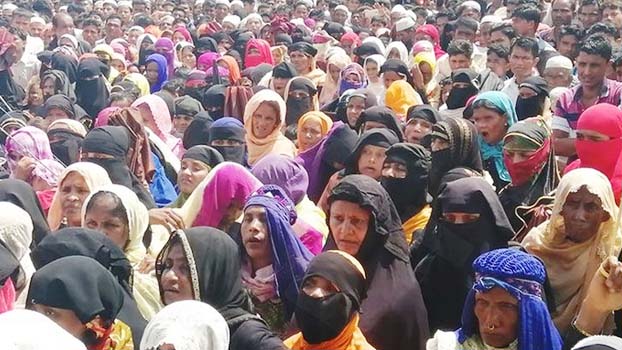Rohingyas reluctant to use birth control method

The Rohingyas, who fled Myanmar to Bangladesh to save their lives, arrived and settled in Cox's Bazar the same day two-year ago. Twice the time was fixed for their repatriation, but the attempt failed. The new Old Mill now houses about one million Rohingyas in 12 camps of Ukhia and Teknaf in Cox's Bazar. The number of repatriated Rohingyas, however, were increased to 4,000 children born during last two years.
It is learnt, almost all Rohingyas are reluctant to use birth control methods that is why most Rohingya family at the camps consists of five to eight members.
On the back drop of a terrorist attack at five army outposts in Arakan province, Myanmar's military junta started a crackdown against Rohingya population on August 27. The Myanmar's military junta with the Buddists population there resorted to kill indiscriminately Rohingys including woment and children, rape Rohingya women, setting their houses ablaze aiming to annihilate them from their motherland. To save their lives, there was a huge influx of Roahingya population from across the border who were ultimately given shelter in refugee camps at Cox's Bazar from August 25, 2017.
At that time, Rohingya, who came to Bangladesh to save lives were given shelter in Bangladesh under the direction of Prime Minister Sheikh Hasina. Considering the humanitarian reason, she ordered to give shelter of thousands of those Rohingya refugees at Cox's Bazar. From that period, with the help of the government of Bangladesh, domestic and foreign development agencies are providing the Rohingyas with food, shelter, education and other humanitarian needs.
Among the Rohingyas in Cox's Bazaar, the number of women surpassed men. Many of them were also married at the camps. Dr. Pintu Kanti Bhattacharya, Assistant Director of Family Planning at Cox's Bazar said, the Rohingya women were less interested in adopting birth control methods. He said, the Rohingya women and men are being made aware of birth control through 122 health centers at the camps.
Abdul Majid, a resident of the Rohingya camp in Madhya Ukhia said, his two wives have 22 children. Asked about birth control, he said, "By Allah's command, children are born, how do you stop them by taking medicines (birth control pills)?."
Abul Kashem, newly married in the same camp, said, "For six months we have been married. Health assistants tell my wife to take pills. But I forbade her. Because it is the command of Allah."
Rohingya Nurul Quader, an elder of the Leda camp in Teknaf, said, " Applying any drug for not having a baby would be like giving a hand to Allah's command. We cannot commit that sin."
Rahima Bibi, a Rohingya woman who lives in the same camp, said, "I have five children. And to have no children, I took the pills for a few days,but after knowing, my husband stopped me from taking the pills".
Additional Commissioner for Refugee Relief and Repatriation Commission Office Shamsuddoja Nayan, quoting UNHCR's demographic report said during last two years, at least 2,000 children were born in 12 Rohingya camps during last two years. He said various activities were going on in the camps to prevent the population boom.
Cox's Bazar Deputy Commissioner Md Kamal Hossain said the government is working to provide food, shelters, medicine and other ncessicities for humanitarian reasons. The administration was also working tirelessly to send the Rohingya population back home.
On November 7 last year and August 22 this year, two repatriation attempts were made, but mainly due to relucatance from Rohingyas refugees, the repartriation attempt failed. However, diplomatic efforts is underway to ensure a safe return of Rohingya refugees soon.




